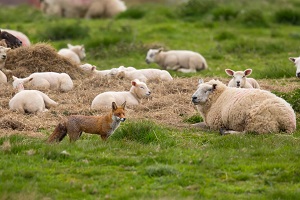Lamb Predation: Who Dunnit?
Clinical Connections – Summer 2023
Henny Martineau, Head of Veterinary Forensic Pathology and Lecturer in Anatomic Pathology
We have been collecting data from sheep farmers on the predation of lambs by wild animals in the UK. Predation is defined as “the act of a predator species catching, killing, and subsequently eating parts of their prey.” Predation of lambs by wildlife not only causes detrimental suffering to lambs and ewes but can also have a significant emotional and economic impact on farmers.
The aim of the research is to improve the current understanding of the incidence of lamb predation throughout the UK, identify risk factors involved, and find out more about possible species contributing to these losses.
I developed a particular interest in this area after my involvement in an investigation into the cause of a series of cat mutilations across England. Originally thought to be caused by a human (aka ‘the Croydon Cat Killer’), we used DNA analysis and detailed post mortem examination protocols, to show the injuries to be consistent with scavenging by a fox after the cats had died. The causes of death were variable, but to our surprise some of them had been predated by foxes.

Foxes and badgers
Previous research has shown that more than half of farmers reported the loss of at least one lamb to fox predation in their most recent lambing season, while another study indicated that predation by wildlife was the main cause of lamb mortality. In the UK, foxes are considered to be one of the main wild predator species for lambs, but badgers may also play a role.
Since the 1992 Protection of Badgers Act, there has been an increase in the badger population and, somewhat unsurprisingly, an increase in claims that they kill lambs. However, there are no recorded patterns of predation by badgers in the literature. Therefore, another aim of this study was to find what criteria farmers use to decide if a lamb has been killed by a fox or a badger.
One way of helping to identify the predator species is to perform a post mortem examination on the dead lamb. At post mortem, the first thing to determine is whether the lamb was really predated or actually scavenged after it died from another cause. We do this by looking for evidence of fresh blood associated with wound edges, which would indicate the animal was bleeding and therefore alive at the time of the attack.
If there is no blood, then we assume the body parts were removed after death (scavenged) and the lamb likely died from another cause. Then we look for the patterns of mutilation i.e. specific parts of the carcasses that are missing, which can differ between predator species. For example, when cats are scavenged by foxes, the most common missing body parts are the head, neck and tail, but when they are scavenged by coyotes, removal of internal organs is more common.
Other evidence of the predator involved can be in the form of excrement on or near the carcass, puncture wounds from teeth in the skin and underlying soft tissues, or marks from claws or teeth on fractured bones.
By combining the post mortem findings of predated lambs with DNA analysis of a swab from the mutilation site, which should have saliva from the predator species, we can get more accurate information on the particular predator species involved in the lamb death. Availability of lamb carcasses for PM can be a challenge however, as predators often remove the carcass or farmers do not have the time to save them during the busy lambing period.
Part of this research is being performed by final year veterinary student Hasita Dodhia as part of her eight-week research project, which takes the form of a short questionnaire. We currently have 184 responses, which goes to show what a relevant topic this is for farmers.
